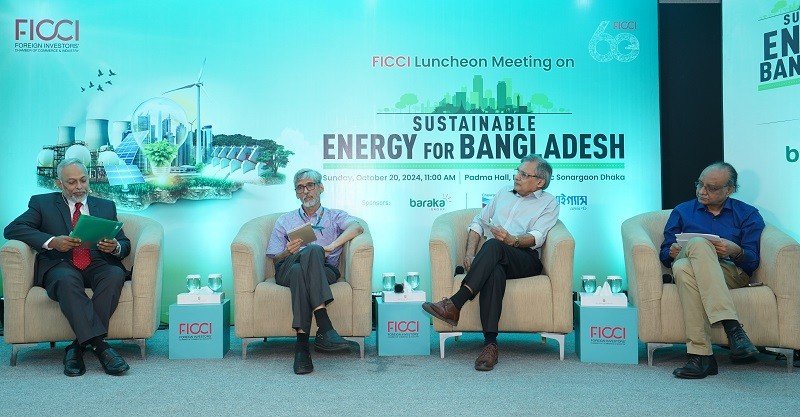
The Foreign Investors’ Chamber of Commerce and Industry (FICCI) hosted a high-profile luncheon meeting at Pan Pacific Sonargaon Dhaka, focusing on the theme of “Sustainable Energy for Bangladesh.”
The event, held on October 20, brought together industry leaders, policymakers, and experts to discuss the country’s energy challenges and explore potential solutions.
The meeting featured Chief Guest Muhammad Fouzul Kabir Khan, Adviser to the Ministry of Power, Energy, and Mineral Resources, who reaffirmed the government’s dedication to building a sustainable energy future. He outlined key initiatives aimed at boosting energy efficiency and diversifying the nation’s energy mix to ensure long-term sustainability.
In his keynote address, Dr. Ijaz Hossain, former Dean of Bangladesh University of Engineering and Technology (BUET), offered an in-depth analysis of the energy landscape. He highlighted the significant shift in energy consumption, noting that industrial use of grid electricity had halved in comparison to the domestic sector since 2010. This shift was attributed to the rapid expansion of rural electrification across Bangladesh. Dr. Hossain emphasized the need to maintain natural gas production by drilling at least 10 new wells annually to avoid over-reliance on imported LNG. He warned that gas demand could surge to 4,622 MMcfd by 2030, presenting a substantial challenge for the state-owned Petrobangla.
Nowshad Ali, Country Manager of GE Vernova Bangladesh, moderated the session, fostering an engaging discussion among the panelists. Dr. Badrul Imam, Honorary Professor at the University of Dhaka, shed light on the geological implications of energy sourcing, while Dr. M. Rezwan Khan, former Vice-Chancellor of United International University, underscored the pivotal role of renewable energy in achieving sustainability. Mollah Amzad Hossain, Editor of *Energy & Power Magazine*, spoke about the importance of media in raising public awareness about energy issues.
The panel discussions generated several important recommendations, including the need to improve regasification infrastructure, speed up natural gas exploration, and diversify energy sources by incorporating more coal and renewables. Dr. Hossain also called for greater competition in the transport sector through fuel diversification and stressed the importance of curbing gas misuse to ensure efficient resource utilization.
The meeting concluded with a sense of optimism, with participants expressing confidence in the potential for collaboration between the government and the private sector to address Bangladesh’s energy challenges. The event highlighted the urgency of transitioning to a sustainable energy system that will support Bangladesh’s economic growth while balancing environmental and resource management concerns.
Attendees included diplomats, high-ranking officials from FICCI member companies, board members, and key stakeholders, all of whom contributed to the dialogue on shaping a resilient energy future for the country.
 Weekly Bangla Mirror | Bangla Mirror, Bangladeshi news in UK, bangla mirror news
Weekly Bangla Mirror | Bangla Mirror, Bangladeshi news in UK, bangla mirror news







